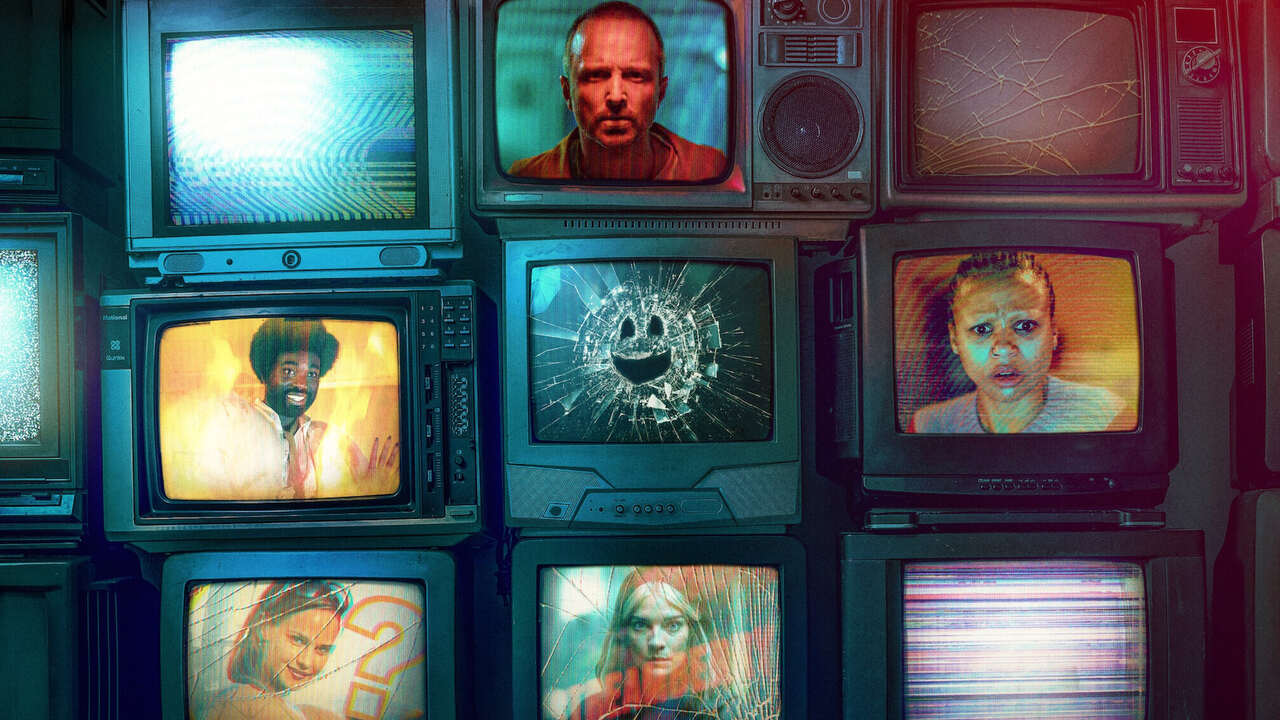
Like most anthologies, the sixth season of Black Mirror (written by Bisha K. Ali and Charlie Brooker) consists of its share of hits and misses. The good news, though, is that there are more hits than misses. The sixth season contains five episodes, with the first one being the best of the lot. The other stories aren't precisely uninteresting. It's just that they rely too much on the writing and the actors to do the heavy lifting. Episode 1 (and, to a large extent, even 6) sticks out because you feel every aspect is working in sync to deliver an amusing, satisfying experience.
The first episode is titled Joan Is Awful, but when we first see Joan (Annie Murphy), she registers as an ordinary and kind individual. She lip-syncs to a song in a car, and you ponder how a sweet woman like her can be awful. On top of that, her initial "awful" moments are served with a dose of embarrassment as Joan awkwardly (and as politely as possible) fires an employee and regrets kissing an ex-lover. The real trouble starts when she discovers a show called "Joan Is Awful" on Streamberry, a Netflix-like streaming service. This Streamberry series displays a dramatized version of Joan's life in which Salma Hayek plays the lead role. What's more, this TV Joan finds another "Joan Is Awful" show where Cate Blanchett plays another version of Joan.
Directed by Ally Pankiw, this episode has an entertaining "What the hell's going on?" energy. It's wild, creepy, and funny. Through its outlandish text, the episode indicates that a "based on a real person" piece of work can hugely influence the perspective of the audience. The dramatization can, in fact, destroy the life of the real, living-breathing subject. However, the streaming services that host these contents and make money out of them do not care about anyone's grievances. Even the actors cannot leave a dent in the big corporations. Streamberry uses CGI and other technologies to exploit both the users and the actors to churn out content for their online library. Put simply, streaming giants are evil and have a hand in destroying the art of filmmaking. This notion is not exactly a lie, which is why you laugh as well as cheer for the characters when one of them whispers, "Let's kill this quam-puta." Hell yeah! Let's get rid of algorithmic "entertainment."
The second episode, named Loch Henry (Sam Miller serves as the director), too, criticizes streaming services and viewers who feed on sensational content. Like any other horror movie, the story first removes the sense of beauty from the small town setting and then gives us a serial killer narrative. Loch Henry suggests there is an abundance of true crime Netflix documentaries, and most of them are simply tacky (trash shot on 4K is nothing but trash). The primary sin committed by these documentaries is that they open old wounds and sell someone's pain as a spectacle. On top of that, there is a lot of difference between the real truth and the documentary truth. One is painful and horrifying, while the other merely pretends to be frightening. The only weak portion here is a flashback that gets punctuated through the reaction shots of a character. For a few minutes, the episode wears the same tone it sets out to criticize, though it quickly regains its strength thanks to some affecting final moments and committed performances.
Performances again emerge as a strength in Beyond The Sea, directed by John Crowley. It walks that path concerning men and machines and how some purists prefer the former over the latter. It's a tale of heartbreak and tragedy and how some people try to snatch your life and body (literally, in this case) when you lend them a helping hand. Everything is buoyed by the presence of actors like Josh Hartnett and Aaron Paul, and while the story is predictable, it's still uneasy to witness.
The fourth episode, Mazey Day, is the weakest link here. Directed by Uta Briesewitz, the story not only offers a commentary on the terrible habits practiced by the paparazzi, but it's also a werewolf movie. The length here is both a boon and a bane. Briesewitz recognizes that her story doesn't have enough meat and appropriately wraps everything up within 40 minutes. On the other hand, this short runtime means none of the threads are adequately developed, which is why you are left unsatisfied. Ultimately, it's just Zazie Beetz who walks out with a trophy. She is the best thing in this story.
Finally, we have Demon 79, where horror and comedy elements are mixed to generate something enjoyable. Directed by Toby Haynes, the episode focuses on Nida (Anjana Vasan), a sales assistant who is often hit by violent tendencies but never acts on them. That is until she comes across a demon named Gaap (Paapa Essiedu), who tells her she must kill three people to prevent a world-ending disaster. Vasan effectively displays the transformation from a meek worker to a murderess, and Essiedu is wonderful as her funny companion. However, the most endearing thing about this story is its message: A world that has no place for diversity deserves to go up in flames. Amen to that.
Final Score- [8/10]
Reviewed by - Vikas Yadav
Follow @vikasonorous on Twitter
Publisher at Midgard Times
Hi Everyone, after a due consideration, we have decided that we will be open for donations to help us in managing our website. We will be greatful for any kind of amount we receive. Thanks!
— Midgard Times 🎬 (@Moviesr_net) January 4, 2026
PayPal- [email protected] pic.twitter.com/DlNNz5Npm5
Get all latest content delivered to your email a few times a month.
Bringing Pop Culture News from Every Realm, Get All the Latest Movie, TV News, Reviews & Trailers
Got Any questions? Drop an email to [email protected]